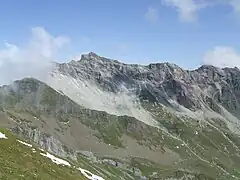| Tristel Formation | |
|---|---|
| Stratigraphic range: Late Barremian-Early Aptian ~ | |
 Tristel Formation near its type locality, looking at Naafkopf from the southwest | |
| Type | Geological formation |
| Unit of | Rhenodanubic Group, Bündnerschiefer |
| Thickness | 150–250 m (490–820 ft)[1] |
| Lithology | |
| Primary | Limestone, marl |
| Other | Shale |
| Location | |
| Coordinates | 47°03′39″N 9°36′25″E / 47.060767°N 9.607067°E |
| Region | Allgäu, Oberbayern, Tirol, Vorarlberg |
| Country | |
| Type section | |
| Named for | Tristel, a mountain next to the Naafkopf |
| Named by | Schwizer |
| Year defined | 1984 |
The Tristel Formation is a stratigraphic formation of the northern-central Alps, deposited between the late Barremian and the early Aptian of the Early Cretaceous. It consists of thickly banked limestones, marls and shales.[1] It is the lowest formation of the Bündnerschiefer and belongs to the Rhenodanubic Group.[2]
Outcrops can be found in the Engadin window, the Tauern window, the Rechnitz window, and many localities of the Penninic realm of the eastern and western Alps.[3]
The type locality is the area around the Naafkopf (47°03′39″N 9°36′25″E / 47.060767°N 9.607067°E) in the border region of Austria, Liechtenstein and Switzerland.[1]
The Tristel Formation can be correlated with the Klus Formation in Graubünden and the Couches de l’Aroley Formation in Savoie (France) and Valais (Switzerland).[4][5]
References
- 1 2 3 "Tristel-Formation". Lithostratigraphische Einheiten Deutschlands.
- ↑ Tricart, Pierre-Charles de Graciansky, David G. Roberts, Pierre (2010). The Western Alps, from rift to passive margin to orogenic belt : an integrated geoscience overview (1st ed.). Amsterdam: Elsevier. p. 158. ISBN 978-0444537249.
{{cite book}}: CS1 maint: multiple names: authors list (link) - ↑ "Stratigraphische Tabelle von Österreich" (PDF) (in Austrian German). 2004. Archived from the original (PDF) on 30 September 2007. Retrieved 2023-05-28.
- ↑ Loprieno, Andrea (2011). "The Valais units in Savoy (France): a key area for understanding the palaeogeography and the tectonic evolution of the Western Alps". International Journal of Earth Sciences. 100 (5): 963. Bibcode:2011IJEaS.100..963L. doi:10.1007/s00531-010-0595-1. hdl:20.500.11850/37751. S2CID 56379732.
- ↑ Tricart, Pierre-Charles de Graciansky, David G. Roberts, Pierre (2010). The Western Alps, from rift to passive margin to orogenic belt : an integrated geoscience overview (1st ed.). Amsterdam: Elsevier. p. 153. ISBN 978-0444537249.
{{cite book}}: CS1 maint: multiple names: authors list (link)